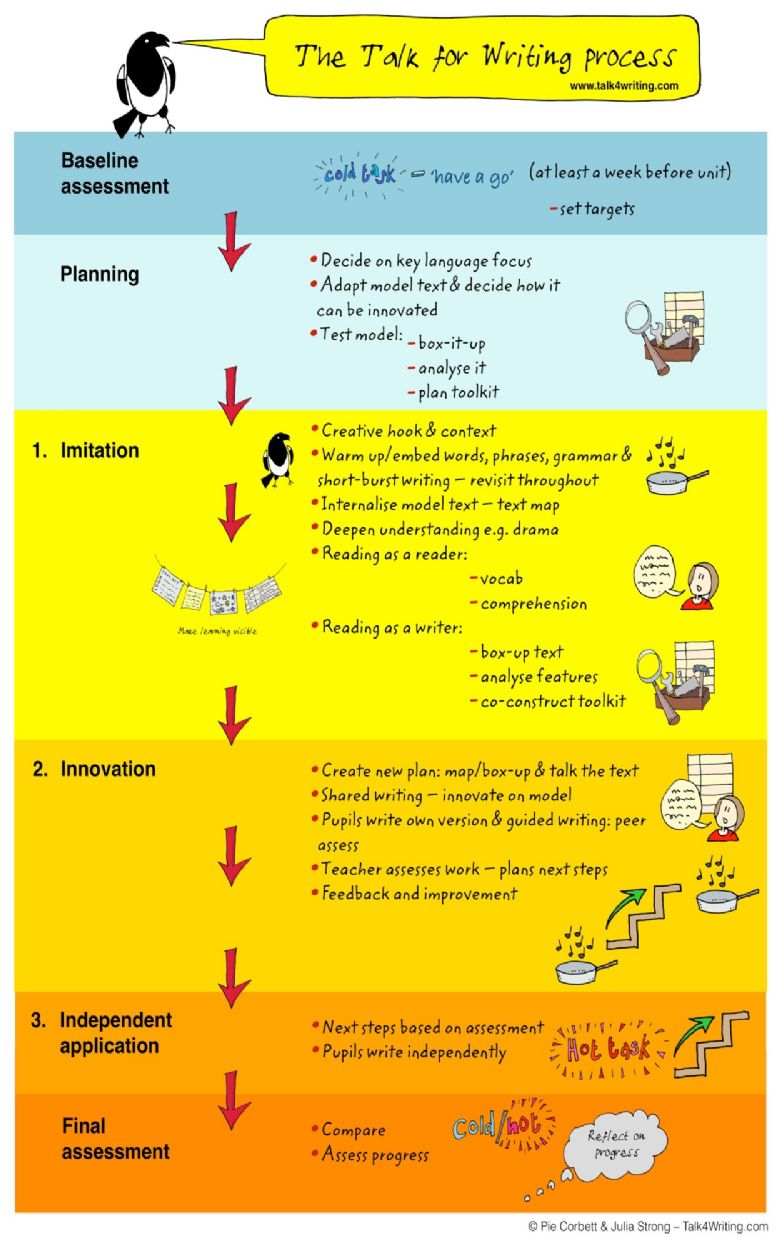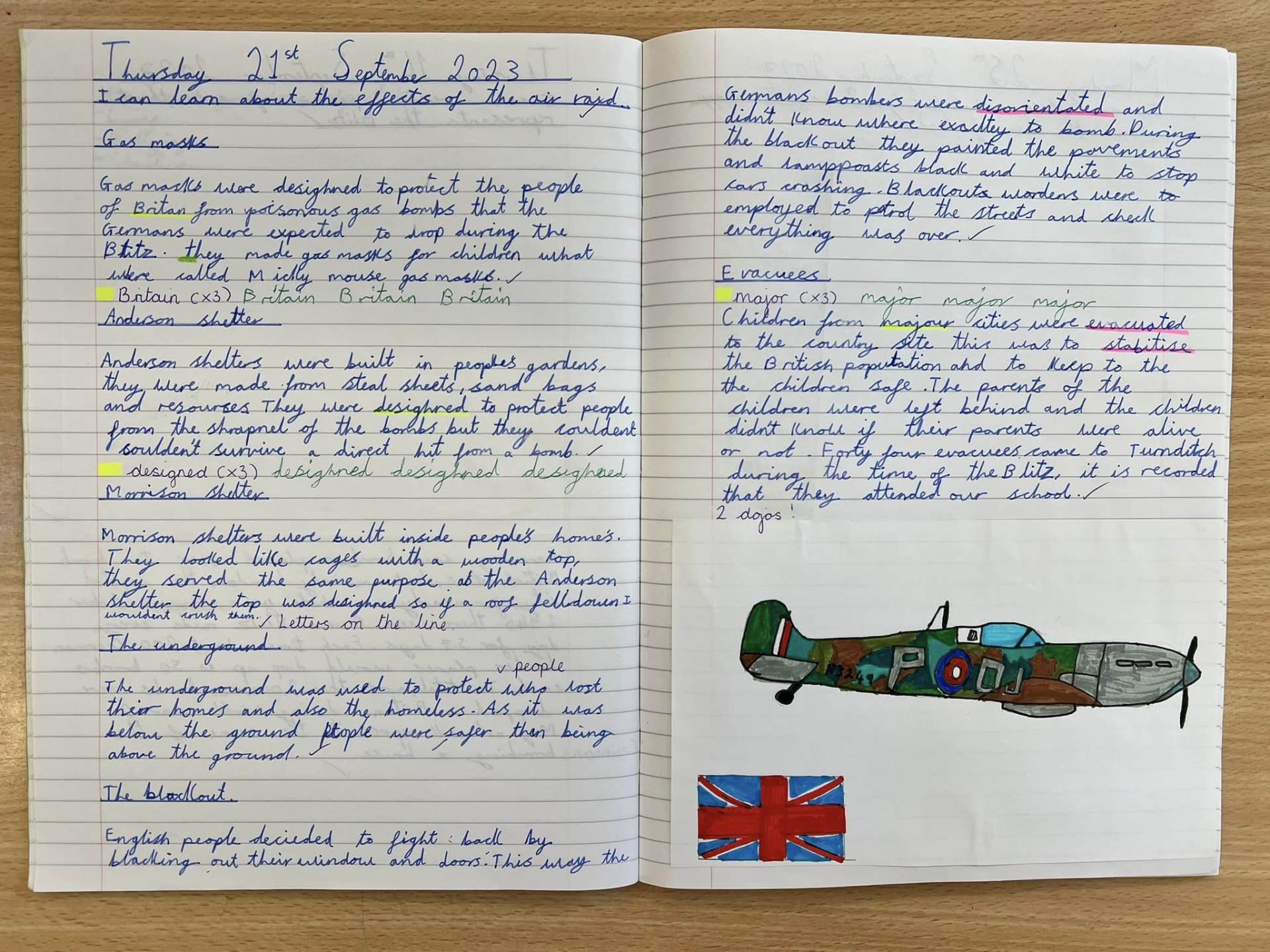Writing
At Turnditch, we foster an ethos that values the freedom of expression and creativity that Writing provides. The aim is to help children make faster progress and gain confidence and pleasure as a writer. By offering shared writing opportunities and supportive writing we ensure that our children develop a deep understanding of writing any genre or text type.
National Curriculum states, the programmes of study for writing at key stages 1 and 2 are constructed similarly to those for reading:
- transcription (spelling and handwriting)
- composition (articulating ideas and structuring them in speech and writing).
It is essential that teaching develops pupils’ competence in these two dimensions. In addition, pupils should be taught how to plan, revise and evaluate their writing.

All pupils at Turnditch CE Primary School access the Talk4Writing programme devised by the author and educationist Pie Corbett.
The Talk for Writing approach enables children to read and write independently for a variety of audiences and purposes within different subjects. A key feature is that children internalise the language structures needed to write through ‘talking the text’, as well as close reading. The approach moves from dependence towards independence, with our teachers using shared and guided teaching to develop the ability in children to write creatively and powerfully.
To view a synopsis of the Talk4Writing approach please click here.
At Turnditch we have created a yearly overview for the whole school from Reception to Year 6. We have selected 6 narrative genre types and 6 non-fiction genre types which all children cover over the academic year. Therefore, each half term you will see the same genre type being taught throughout the school. We have also allocated specific grammar focus' for each unit based on National Curriculum objectives for that year group and these are revisited during the year in both children's narrative and non-fiction writing.
Each unit is based upon a 'Model Text' which has been written by the class teacher. These are based upon a 'real' high quality book which the children have read previously.
To view the yearly overview for our narrative units please click here.
To view the yearly overview for our non-fiction units please click here.
The key phases of the Talk for Writing process, as outlined below, enable children to imitate orally the language they need for a particular topic, before reading and analysing it, and then writing their own version.

The Cold Task
Teaching is focused by initial assessment. Teachers use what is known as a ‘cold’ task. An interesting and rich starting point provides the stimulus and content but there is no initial teaching. The aim of this is to see what the children can do independently at the start of a unit, drawing on their prior learning. Assessment of their writing helps the class teacher work out what to teach the whole class, different groups and adapt the model text and plan. Targets can then be set for the class. By the end of the unit, pupils complete a ‘hot’ task which is an independent task on a similar type of writing. Progress should be evident which encourages pupils and helps school track the impact of teaching.
The Imitation Stage
The teaching begins with a creative ‘hook’ which engages the pupils, often with a sense of enjoyment, audience and purpose. The children are then introduced to a model text. The model text has built into it the underlying, transferable structures and language patterns that the children will need when they are writing. This is learned using a ‘text map’ and actions to strengthen memory and help students internalise the text. Activities such as drama are used to deepen understanding of the text.
Once the children can ‘talk like the text’, the model, and other examples, are then read for vocabulary and comprehension, before being analysed for the basic text (boxing up) and language patterns, as well as writing techniques or toolkits.
The 'boxing up' provides children with a basic structure for their stories and is used to plan.
Each unit also has a 'Toolkit' focus. These provide children with the writing techniques which will help them to develop their writing. The 'Toolkits' progress over the Key Stages and are built upon year on year.
The Innovation Stage
Once pupils are familiar with the model text, then the teacher leads them into creating their own versions. A new subject is presented and the teacher leads the children through planning. With younger pupils, this is based on changing the basic map and retelling new versions. Older children use boxed-up planners and the teacher demonstrates how to create simple plans and orally develop ideas prior to writing. Ideas may need to be generated and organised or information researched and added to a planner. Shared and guided writing is then used to stage writing over a number of days so that pupils are writing texts bit by bit, concentrating on bringing all the elements together, writing effectively and accurately. Feedback is given during the lessons so that children can be taught how to improve their writing, make it more accurate, until they can increasingly edit in pairs or on their own.
The Invention Stage - The Hot Task
Eventually, pupils move on to the third phase, which is when they apply independently what has been taught and practised. Before this happens, the teacher may decide to give further input and rehearsal. Children are guided through planning, drafting and revising their work independently. It is essential to provide a rich starting point that taps into what pupils know and what matters so that their writing is purposeful. Writing may be staged over a number of days. With non-fiction, children apply what they have been taught across the curriculum. The final piece is used as the ‘hot’ task, which clearly shows progress across the unit.







